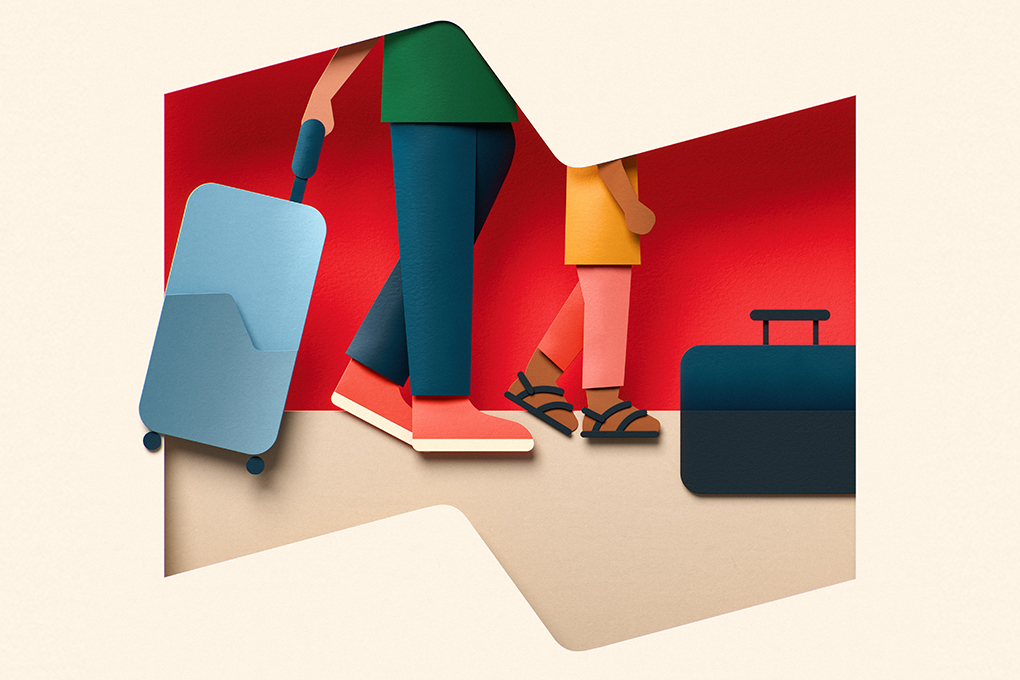1. Protect yourself with travel and rental insurance
If you take more than one trip per year, you could benefit from having a credit card that boasts comprehensive travel insurance. This would cover unexpected events like trip cancellation and interruption, flight delays, lost baggage and medical issues.
Just do the math. Is the annual fee for the card less than what you would spend on private coverage? Choosing a credit card with travel insurance could save you time and money in your planning process.
Some credit cards also offer insurance on car rentals. This is a great way to save if you rent a vehicle.
2. Avoid currency conversion charges
Some companies don’t charge any fees for foreign currency conversion. However, fees typically range from 2.5% to 3% per transaction, so don’t forget to look into your credit card’s policies beforehand.
It’s a small detail that can make a big difference for your wallet and help you stick to your travel budget!
3. Earn cashback and rewards points
Many travel credit cards offer great rewards programs, allowing you to earn rewards points or cashback for each dollar you spend.
Points can be redeemed for travel discounts, gift cards and even discount on banking products.
4. Extend the warranty on your purchases
Another positive is the opportunity to benefit from insurance and extended warranties on purchases.
Let’s imagine you bought a pair of sunglasses ahead of your trip. By putting the purchase on your credit card, you’d be insuring it against theft and damage, as well as extending the seller’s warranty. And that’s not to mention the rewards points or cashback you could earn. These savings might seem small at first, but they add up quickly.
5. Take advantage of exclusive travel benefits
If you’re a frequent flyer, you’ll appreciate the reimbursement of certain parking, baggage check and seat selection fees that comes with some credit cards, as well as being able to access private airport lounges. With free newspapers, Wi-Fi, drinks and snacks, waiting for a flight has never been so enjoyable!
Some credit cards even offer the equivalent of a free night in a hotel or plane ticket when you sign up.
6. Give yourself more flexibility in your transactions
With a higher credit limit, a credit card can also give you greater financial freedom. You won’t have to worry about funds being held for pre-authorizations, and be able to deal with any unexpected expenses that may come up during your trip.
Booking flighs, shuttles, hotels and activities abroad now happens almost exclusively online, sometimes months in advance. This makes having a credit card pretty much essential for anyone planning a trip.
By using your card to book, you can set off with peace of mind, knowing that you won’t have to compromise on the quality of your lodgings or activities once you arrive. Both flexible and versatile, a credit card is a must for making reservations, and a nice asset for everyday spending.

Good to know: In the United States, some gas stations require a 5-digit ZIP code for payment at the pump. Pro tip: Enter 00, followed by the 3-digit postal code linked to your credit card! For example, if your postal code is H3T 4B7, enter: 00347.
7. Protect yourself against fraud
If your credit card is cloned while you’re making a purchase in a store, most financial institutions will not hold you responsible for fraudulent transactions carried out in your name.
The amount lost will be refunded in full soon after it's reported, with or without fees.
8. Make group travel easier
Managing group bills is easy with a credit card.
Save yourself the headache of individually tracking your group's expenses. Simply use your card to pay for shared expenses during your trip, then check your statements and split the bill when you get home.
Some companies also show purchases in Canadian dollars as well as the currency of the purchase. It's a small detail that can help you visualize and organize your expenses.
9. Access cash when you need it
While you’re abroad, use your credit card for larger expenses, like activities and meals.
If you need to make a withdrawal, try to use an ABM that is part of the Cirrus or Plus network. Certain companies don’t allow this type of transaction, so speak to your financial institution before you leave.

Good to know: If you want to make withdrawals using your card, be aware that interest will be calculated starting from the first day, along with transaction and conversion fees.
Debit, credit or cash... Which one should you use, and in what circumstances?
As a general rule, cash is still the easiest way to make everyday purchases abroad.
Credit cards remain the best all-purpose payment method, accepted in far more places abroad than debit cards.

Good to know: It’s also a good idea to take more than one card with you when you go away to avoid finding yourself without any resources if your card is lost, stolen or blocked. In addition, payment methods and technology can vary from country to country. Your card could be refused. It’s always smart to have a few different ways to pay, to make sure you have all your bases covered.
Would you like to discuss this with us? Contact your National Bank
advisor or your wealth advisor at National Bank
Financial. Don't have an advisor?

